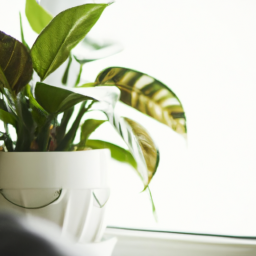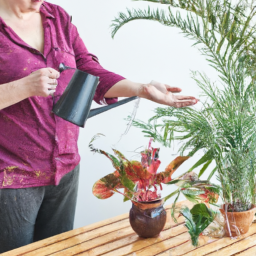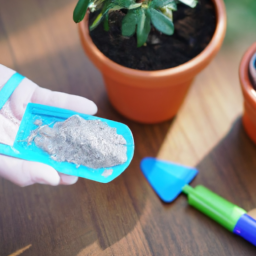
Have you ever wondered if it’s a good idea to keep indoor plants in your bedroom? Many people are drawn to the idea of having greenery in their living spaces, as plants can bring a sense of calm and beauty to any room. However, when it comes to the bedroom, some concerns may arise. In this blog post, we will explore the question, “Should indoor plants be kept in the bedroom?” We’ll discuss the potential benefits and drawbacks of having plants in your sleeping space, and ultimately help you decide whether it’s the right choice for you. So, let’s dive in and explore the fascinating world of indoor plants and their place in the bedroom.
Benefits of Keeping Indoor Plants in the Bedroom
Indoor plants have become increasingly popular in homes due to their aesthetic appeal and numerous health benefits. Many people wonder whether it is suitable to keep indoor plants in the bedroom. In this article, we will explore the advantages of having indoor plants in your bedroom and provide you with a step-by-step guide to help you decide whether it is the right choice for you.
Improved Air Quality and Oxygen Levels
One of the primary benefits of keeping indoor plants in the bedroom is the improvement in air quality. Plants naturally absorb carbon dioxide and release oxygen through a process called photosynthesis. This can help increase the oxygen levels in your bedroom, creating a more refreshing and revitalizing environment for sleep. Additionally, certain indoor plants, such as snake plants and peace lilies, have been found to remove toxins like formaldehyde and benzene from the air, further purifying the atmosphere in your bedroom.
Moreover, indoor plants act as natural humidifiers, releasing moisture into the air through a process known as transpiration. This can be particularly beneficial in dry climates or during winter months when heating systems tend to dry out the air. By increasing the humidity in your bedroom, indoor plants can help alleviate respiratory problems, reduce dry skin, and ease symptoms of allergies or asthma.
Lastly, the presence of indoor plants in your bedroom can significantly reduce airborne dust particles. The leaves of plants capture dust, preventing it from circulating in the air and settling on surfaces. This can contribute to a cleaner and healthier sleeping environment, especially for individuals with dust allergies or sensitivities.
Promoting Relaxation and Reducing Stress
Another advantage of having indoor plants in the bedroom is their ability to promote relaxation and reduce stress. The sight of greenery and nature has been proven to have a calming effect on the mind and body. The presence of plants in your bedroom can create a soothing and tranquil atmosphere, helping you unwind after a long day and prepare for a restful sleep.
Studies have shown that being around indoor plants can lower blood pressure, reduce heart rate, and decrease feelings of anxiety and stress. The natural beauty of plants and the connection to nature they provide can evoke positive emotions and create a sense of serenity within the bedroom environment.
Furthermore, indoor plants can improve the acoustics in your bedroom by absorbing sound waves and reducing noise levels. This can be particularly beneficial if you live in a noisy neighborhood or have trouble falling asleep due to external disturbances. The combination of improved air quality, visual appeal, and enhanced acoustics makes indoor plants an excellent addition to your bedroom for promoting relaxation and a peaceful sleep.
Enhancing Aesthetics and Mood
Indoor plants can significantly enhance the aesthetics of your bedroom, creating a visually pleasing and inviting space. The vibrant colors, textures, and shapes of various plants can add character and beauty to any room. Whether you prefer large leafy plants or delicate flowering ones, there is a wide variety of indoor plants to choose from that can complement your bedroom decor and personal style.
In addition to their visual appeal, indoor plants can also have a positive impact on your mood and overall well-being. Research has shown that being surrounded by plants can boost creativity, productivity, and concentration. Having indoor plants in your bedroom can create a more inspiring and uplifting environment, making it an ideal space for reading, working, or engaging in hobbies.
Moreover, taking care of indoor plants can be a rewarding and therapeutic experience. The act of nurturing and tending to plants can provide a sense of purpose and fulfillment. It can also serve as a mindful practice, allowing you to connect with nature and find moments of tranquility in your daily routine.
In conclusion, keeping indoor plants in the bedroom offers numerous benefits, including improved air quality, relaxation, and enhanced aesthetics. The presence of plants can create a healthier and more visually appealing environment, promoting better sleep and overall well-being. However, it is essential to consider factors such as available space, lighting conditions, and personal preferences when deciding which indoor plants to keep in your bedroom. By carefully selecting and caring for indoor plants, you can transform your bedroom into a peaceful sanctuary where nature thrives alongside you.

Should Indoor Plants Be Kept in Bedroom?
Factors to Consider Before Keeping Indoor Plants in the Bedroom
Indoor plants have gained popularity not only for their aesthetic appeal but also for their ability to improve air quality and create a soothing environment. Many people wonder whether it is safe and beneficial to keep indoor plants in the bedroom. While there are various factors to consider, such as the type of plant and personal preferences, let’s delve into the key aspects that can help you make an informed decision.
1. Air Quality and Oxygen Levels
The quality of air in our bedrooms directly affects our sleep quality and overall well-being. Indoor plants have the remarkable ability to purify the air by removing harmful toxins and releasing oxygen. However, it is essential to consider the oxygen levels during the night when plants undergo respiration, consuming oxygen and releasing carbon dioxide. While this process is typically balanced during the day, it may become a concern in a closed bedroom environment.
One solution is to choose plants that release oxygen even at night, such as the snake plant (Sansevieria), orchids, or aloe vera. These plants can help maintain a healthy oxygen level in the bedroom, promoting better sleep. Additionally, ensuring proper ventilation in the room can also mitigate any potential issues.
It’s worth noting that if you have allergies or respiratory conditions, certain plants may release pollen or volatile organic compounds (VOCs) that could trigger symptoms. In such cases, it is advisable to consult with a healthcare professional before introducing indoor plants into your bedroom.
2. Humidity and Moisture
Indoor plants release moisture through a process called transpiration, which can increase humidity levels in the surrounding environment. While this can be beneficial in dry climates or during winter when indoor heating tends to dry the air, excessive humidity can lead to mold growth and create an uncomfortable sleeping environment.
To prevent excessive humidity, consider placing a dehumidifier in the bedroom or choose plants that have low transpiration rates. Succulents like the jade plant (Crassula ovata) or cacti are excellent options as they require minimal watering and release less moisture into the air.
Furthermore, ensure proper drainage for your plants to avoid water accumulation, which can also contribute to increased humidity. Regularly monitor the moisture levels in the bedroom to strike a balance that suits both your plants and your personal comfort.
3. Fragrance and Allergies
Some indoor plants, such as lavender (Lavandula) or jasmine (Jasminum), emit pleasant fragrances known for their calming and sleep-enhancing properties. These aromatic plants can create a serene atmosphere in the bedroom, promoting relaxation and better sleep quality. However, it is crucial to consider any allergies or sensitivities you or your partner may have.
If you or your partner are prone to allergies, it is advisable to choose fragrance-free plants or opt for essential oils or natural room sprays that mimic the scent of plants without triggering any allergic reactions. It’s essential to prioritize your health and comfort when selecting plants for your bedroom.
In conclusion, the decision to keep indoor plants in the bedroom depends on various factors. Consider the air quality, oxygen levels, humidity, and personal preferences before introducing plants into your sleeping space. Remember to choose plants that release oxygen at night, maintain appropriate humidity levels, and be mindful of any allergies or sensitivities. By carefully considering these factors, you can create a harmonious and healthy environment that promotes restful sleep and enhances the overall ambiance of your bedroom.

Should Indoor Plants Be Kept in Bedroom
Many people enjoy having indoor plants in their homes as they provide numerous benefits, such as improving air quality, reducing stress, and adding a touch of nature to the surroundings. However, when it comes to keeping indoor plants in the bedroom, there are some factors to consider. In this article, we will analyze whether indoor plants should be kept in the bedroom and provide you with a step-by-step guide to help you make an informed decision.
Benefits of Indoor Plants in the Bedroom
Before diving into whether indoor plants should be kept in the bedroom, let’s first explore the potential benefits they can offer:
1. Improved Air Quality
Indoor plants are natural air purifiers as they absorb carbon dioxide and release oxygen through photosynthesis. Some plants, such as snake plants and peace lilies, are particularly effective in filtering out harmful toxins from the air, including formaldehyde and benzene. Having these plants in your bedroom can contribute to cleaner and fresher air, promoting better sleep and overall well-being.
2. Reduced Stress and Enhanced Relaxation
Being surrounded by nature has a calming effect on the mind and body. Indoor plants in the bedroom can create a soothing and serene environment, helping to reduce stress levels and promote relaxation. The presence of plants can also contribute to a sense of tranquility, making the bedroom a more peaceful space for rest and rejuvenation.
3. Aesthetically Pleasing and Mood-Boosting
Indoor plants add a touch of beauty and vibrancy to any space, including the bedroom. Their lush green foliage and colorful flowers can uplift the mood and create a visually appealing atmosphere. Waking up to the sight of a thriving plant can bring joy and positivity to your mornings, making your bedroom a more inviting and pleasant place to start the day.
Considerations for Keeping Indoor Plants in the Bedroom
While the benefits of indoor plants in the bedroom are enticing, it is important to consider a few factors before bringing them into your sleep sanctuary:
1. Allergies and Sensitivities
Some individuals may have allergies or sensitivities to certain plants, especially those with pollen or strong fragrances. If you are prone to allergies or have respiratory issues, it is crucial to choose plants that are hypoallergenic and non-toxic. Additionally, regularly dusting and cleaning the leaves of your plants can help minimize the potential for allergic reactions.
2. Sleeping Habits and Bedroom Environment
Consider your sleeping habits and the specific conditions of your bedroom. Some plants release oxygen at night, while others release it during the day. If you prefer a completely dark and quiet sleep environment, it may be best to avoid plants that release oxygen at night, as they could potentially disrupt your sleep. Additionally, ensure that your bedroom receives sufficient natural light or invest in appropriate artificial lighting to support the growth of your indoor plants.
3. Maintenance and Care
Indoor plants require regular care and maintenance to thrive. Consider whether you have the time and commitment to provide adequate care for your plants. This includes watering them appropriately, providing the right amount of sunlight, and regularly checking for pests or diseases. If you are a busy individual or frequently travel, opting for low-maintenance plants that can tolerate occasional neglect might be a more suitable choice.
Best Types of Indoor Plants for the Bedroom
Now that we have explored the benefits and considerations, let’s delve into some of the best types of indoor plants that are well-suited for the bedroom:
1. Snake Plant (Sansevieria Trifasciata)
Snake plants are known for their ability to purify the air by removing toxins like formaldehyde and benzene. They are also low-maintenance plants that thrive in low light conditions, making them perfect for bedrooms. Snake plants have long, upright leaves with a striking appearance, adding an elegant touch to your bedroom decor.
2. Peace Lily (Spathiphyllum)
Peace lilies are excellent air purifiers and can help eliminate harmful pollutants from the air. They also have beautiful white flowers that can enhance the visual appeal of your bedroom. Peace lilies prefer indirect light and moderate watering, making them suitable for bedrooms with varying light conditions.
3. English Ivy (Hedera Helix)
English ivy is a versatile plant that can be grown both as a hanging plant or in pots. It is known for its ability to filter airborne toxins and improve air quality. English ivy prefers moderate to bright light and regular watering. It can be a great choice for bedrooms with ample natural light.
4. Aloe Vera (Aloe Barbadensis)
Aloe vera is not only a popular medicinal plant but also a great addition to the bedroom. It releases oxygen at night, making it beneficial for improving sleep quality. Aloe vera requires bright, indirect light and minimal watering, making it a low-maintenance choice for busy individuals.
5. Spider Plant (Chlorophytum Comosum)
Spider plants are known for their air-purifying qualities and ability to remove toxins like formaldehyde and xylene from the air. They have long, arching leaves with white stripes, adding a unique aesthetic to your bedroom. Spider plants thrive in bright, indirect light and prefer slightly moist soil.
In conclusion, keeping indoor plants in the bedroom can offer numerous benefits, such as improved air quality, reduced stress, and enhanced aesthetics. However, it is essential to consider factors like allergies, sleeping habits, and maintenance requirements before introducing plants into your sleep sanctuary. By choosing the right types of indoor plants that suit your specific needs and preferences, you can create a harmonious and tranquil bedroom environment that promotes well-being and restful sleep.
Summary Snapshot
Indoor plants have become increasingly popular in homes, bringing a touch of nature and a sense of tranquility to our living spaces. But when it comes to placing these green companions in our bedrooms, opinions seem to vary. Some argue that having plants in the bedroom can improve air quality and promote better sleep, while others express concerns about potential risks and drawbacks. So, should indoor plants be kept in the bedroom? Let’s explore both sides of the debate.
Proponents of having plants in the bedroom highlight the numerous benefits they can bring. Plants are known to release oxygen and absorb carbon dioxide, which can improve air quality and promote a healthier environment for sleeping. Additionally, certain plants, such as lavender or jasmine, are believed to have calming effects, helping to reduce stress and anxiety, ultimately leading to a more restful sleep. However, opponents argue that plants release carbon dioxide at night, which could potentially disrupt sleep. Some also express concerns about allergies or mold growth due to increased humidity levels caused by watering the plants. Ultimately, the decision to have indoor plants in the bedroom should be based on personal preferences, considering factors like plant care, potential allergies, and individual sleep patterns.
Here are the top questions that we were asked:
Q1: Is it beneficial to keep indoor plants in the bedroom?
A1: Absolutely! Indoor plants can bring numerous benefits to your bedroom. They not only add a touch of natural beauty to the space but also help purify the air by removing toxins and releasing oxygen. Additionally, plants can improve humidity levels, reduce stress, and promote better sleep quality. So, keeping indoor plants in your bedroom is highly recommended.
Q2: Are there any specific indoor plants that are suitable for bedrooms?
A2: Yes, indeed! Certain indoor plants are particularly well-suited for bedrooms due to their ability to release oxygen at night, which can enhance sleep quality. Some popular choices include the Snake Plant (Sansevieria), Aloe Vera, Peace Lily (Spathiphyllum), and English Ivy (Hedera helix). These plants are known for their air-purifying properties and can thrive in low-light conditions typically found in bedrooms.
Q3: Can indoor plants in the bedroom have any negative effects?
A3: In general, indoor plants are safe to keep in bedrooms. However, it’s essential to consider individual preferences and potential allergies. Some people may be sensitive to the scents or pollen released by certain plants, which could cause discomfort or allergies during sleep. If you have any concerns or known allergies, it’s advisable to choose plants that have minimal fragrance or pollen.
Q4: How should I care for indoor plants in my bedroom?
A4: Taking care of indoor plants in your bedroom is relatively simple. First, ensure they receive adequate light by placing them near a window or providing artificial light if needed. Water your plants regularly, but be cautious not to overwater them, as this can lead to root rot. It’s also beneficial to occasionally wipe the leaves to remove dust and promote healthy growth. Lastly, follow the specific care instructions for each plant, as different species may have unique requirements.
Q5: Can indoor plants attract insects or pests in the bedroom?
A5: While it’s rare, indoor plants can sometimes attract insects or pests. However, with proper care and maintenance, this risk can be minimized. Regularly inspect your plants for any signs of pests, such as webs, tiny insects, or damaged leaves. If you notice any issues, promptly address them using appropriate organic pest control methods or consult a local plant expert for guidance. By maintaining a clean and healthy environment for your plants, the chances of attracting pests in your bedroom are significantly reduced.

James Wong is a renowned ethnobotanist, plant scientist, and local television presenter. With a passion for demystifying plant science, he is known for translating complex botanical concepts into practical advice for everyday plant enthusiasts. James’s expertise spans from traditional gardening to cutting-edge plant technologies, making his insights accessible and informative.


